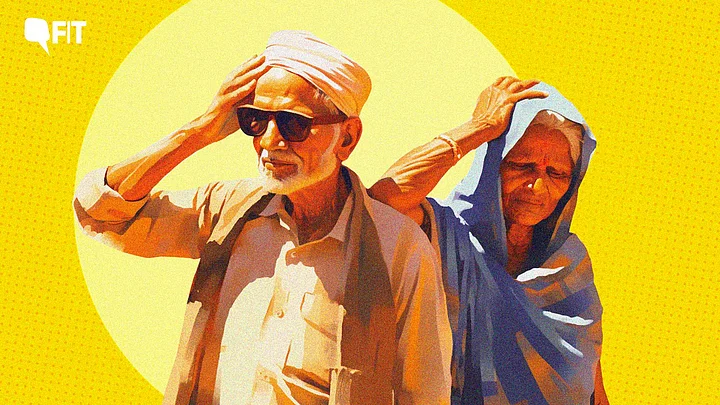Northern India continues to swelter under severe heat as temperatures in parts of UP, Bihar, and Odisha cross 45o Celsius.
Some regions in these states have also been seeing a spike in hospitalisations and deaths in the past week, although officials say most of these fatalities were not linked to heat.
Most of the patients who died were, reportedly, elderly people above the age of 60, with other underlying health conditions.
The Union government has urged state health authorities to take action to mitigate the damage caused by the heatwave.
Those over the age of 60 have, especially, been advised to stay indoors during the day, as they are at at a higher risk of heat stress.
What makes the elderly more prone to heatstroke? How can they be protected? FIT speaks to experts to find out.
What Makes Older People More Prone to Heatstroke?
Lower Body Reserves
Older people are typically more vulnerable to health issues because of their weaker constitution, and this applies to heat exhaustion as well.
As you age, your organ function diminishes. "It is expected that by the age of 70, you would have 30 percent less organ function, and your body reserves are also very less," explains Dr Sushila Kataria, Senior Director, Internal Medicine, Medanta Hospital, Gurugram.
Body reserves refer to the fat, glycogen, and other nutrients stored in your body.
"Their overall vascular volume can also be lesser, which doesn't allow blood to flow into their skin as fast" says Dr Manoj Sharma, Senior Consultant, Internal Medicine, Fortis Hospital, Delhi's Vasant Kunj. He goes on to explain that this is another way the body keeps its core temperature down.
"For this reason, while young people do experience heat exhaustion, classic heatstroke by and large only happens in elderly people."Dr Sushila Kataria, Senior Director, Internal Medicine, Medanta Gurugram
Both Dr Sharma and Dr Kataria also suggest that co-morbidities, such as heart and kidney issues, also make older people more prone to heatstroke.
Heatstroke has more dangerous outcomes in the elderly
"Heatstroke can also worsen chronic conditions. It can cause imbalance in sodium and potassium levels, and dangerous fluctuations in blood pressure," adds Dr Kataria.
"Diabetics patients also have to be careful because high heat can negatively affect sugar levels," adds Dr Tushar Tayal, Consultant, Internal Medicine at CK Birla Hospital, Gurugram.
"If heat exposure continues, the body releases stress hormones such as cortisol and vasopressin that increases blood sugar levels and can cause blood pressure to shoot up."Dr Tushar Tayal
Medication
Moreover, owing to other health issues and co-morbidities, older people may be on medication that can leave them more prone to heatstroke and its symptoms.
"Some medication may reduce sweating, and without sweating, the body is not able to regulate temperature, and the heat can be trapped in the body," says Dr Sharma.
"If they have kidney issues, for instance, they may be on diuretics that makes them urinate more frequently and expel more fluids."Dr Manoj Sharma, Senior Consultant Internal medicine
"This is why dosages of medication should be adjusted according to the weather as well," says Dr Kataria, adding, "We always ask our elderly patients to visit the doctor at the beginning of both winter and summer for a consultation."
'They May Not Feel the Heat'
Older adults also don't have the ability to regulate their body temperature like young people do.
"Sweating is a protective mechanism that our bodies use to cool down and maintain the core temperature. This response may be blunted in the elderly."Dr Manoj Sharma
They may not perspire as much, or even feel as hot as a younger person would.
"This is even more dangerous, because if they don't feel uncomfortable, they won't make an active effort to get away from the situation," says Dr Kataria.
In such a situation, it becomes vital for those around them to keep checking on them. Dr Kataria says the two major symptoms of heatstroke to look out for are:
High temperature
Confusion and loss of consciousness
In extreme cases, Dr Sharma adds, they can experience seizures, muscle damage, and kidney failure (especially in those with pre-existing kidney dysfunction).
How to Protect Them
An obvious protective measure is to make sure they don't step out during the day, especially between 10 AM and 5 PM.
However, experts caution that heat exhaustion can also happen indoors.
"If the indoor temperature is as high as the outdoors, if the room is stuffy, and the person is not properly hydrated, heat exhaustion can happen indoors too, especially in old people," says Dr Kataria.
Poor home design, lack of cooling devices, lack of access to uninterrupted electricity, and low income all contribute vastly contributes to vulnerability to heatwaves in India.
Moreover, not only are older people more prone to dehydration because of all the reasons listed above, they may also be dependent on others to ensure they are drinking enough water.
So, it's important to ensure that the elders in your care are well hydrated.
"Keep giving them ORS, coconut water, or even regular water from time to time," says Dr Sharma.
Lastly, if a person has been exposed to heat and is showing symptoms like vomiting, dizziness, and disorientation out of nowhere, get them medical attention immediately, ads Dr Sharma. "They may require intravenous Lactated Ringer's solution (LR)."

